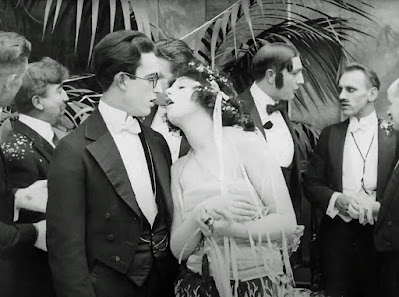Harold Lloyd, Bebe Daniels, Harry 'Snub' Pollard, William Blaisdell, Belle Mitchell, and Helen Gilmore
Director: Alfred J. Goulding
Rating: Six of Ten Stars
A dapper young man (Lloyd) sets out to woo a pretty cleaning lady (Daniels). Trouble, chaos, and police chases ensue.
This is a film that's full of funny bits that are so loosely connected that this film just ends. Literally. Nothing in what little plot we have gets resolved, and if it was a serial I'd be eager to see the next installment, because it ends on quite the cliffhanger. In fact, when the film ended, I thought maybe it was a fragment and that the last few minutes (or maybe an entire second reel) had not survived to the present day... but every description of the film (at IMDB, Wikipedia, and elsewhere) give its run-time as the roughly ten minutes that the version embedded below.
It wasn't a surprising conclusion to reach that I watched a complete version of "Take a Chance", because the version I saw is among one of best preserved and/or restoration jobs of any film from the 1910s I've come across. Nonetheless, it was a disappointing one, because it showed that very little thought was put into what passes for the story here.
Although there are better Harold Lloyd/Bebe Daniels vehicles, this one is still worth watching for a number of reasons. First, Daniels is a joy to watch as always; no one mugged at the camera better than her, nor seemed to be having so much fun or being so annoyed as her. Second, although nearly every one of the loosely connected slapstick and/or comedic chase sequences go on for a little too long, each and every one of them is initially very funny. As a collection of bits, this is an excellent film, but the fact the story presented has a beginning and a middle but no proper end to speak of.
"Take a Chance" is embedded below for your convenience. Take a chance and check it out. See if you agree or disagree with my take... and leave a comment below!
















































.jpg)
